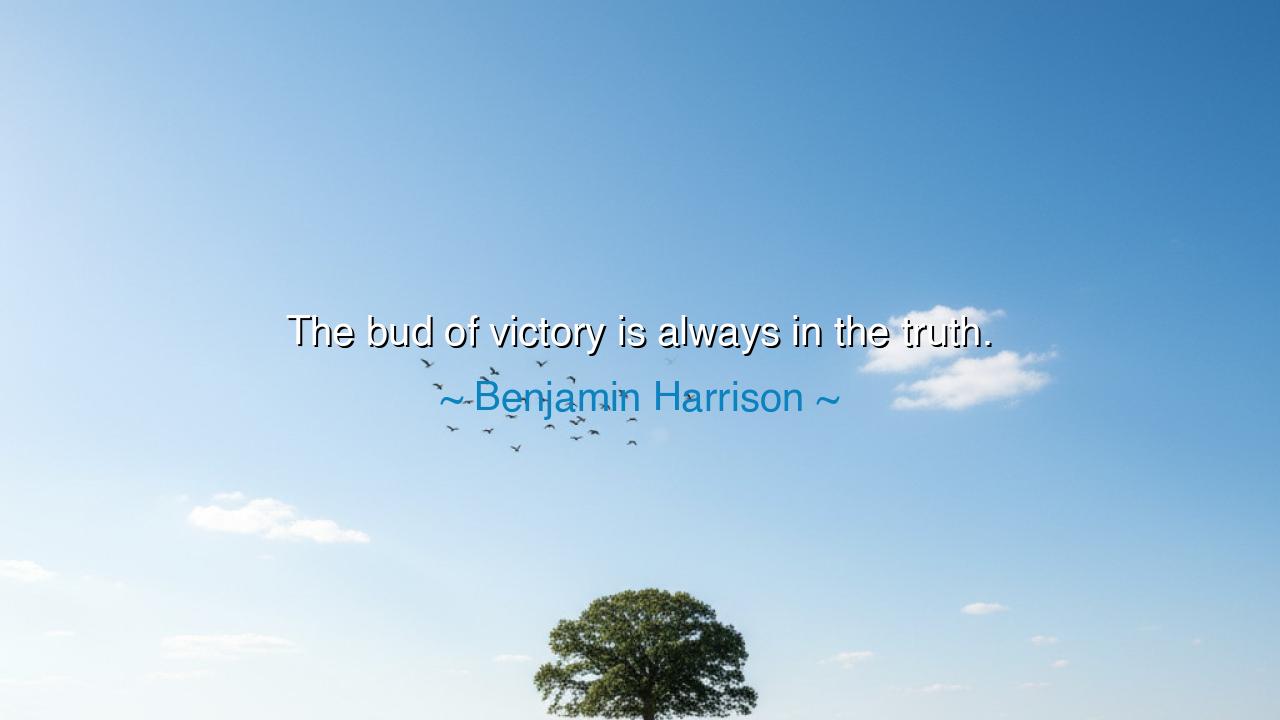
The bud of victory is always in the truth.






Hear the stirring words of Benjamin Harrison, a leader who bore the burdens of his nation: “The bud of victory is always in the truth.” In this brief yet powerful image, he declares that every true triumph begins not with deception, nor with force alone, but with truth. Just as a flower begins as a hidden bud before it blossoms into beauty, so every lasting victory begins with the seed of honesty, integrity, and righteousness. Without it, what may appear as triumph is only a passing shadow, destined to wither.
The ancients knew this well. They told how lies and cunning might win battles for a season, but only truth wins peace. The victories of tyrants, built upon falsehood, crumble like sandcastles before the tide. But the victories of those who stand upon truth endure through the centuries. Thus Harrison’s words remind us that the roots of real greatness do not lie in deception but in alignment with eternal realities. Victory that springs from truth is not fleeting, but eternal.
Consider the story of Abraham Lincoln. When he proclaimed the Emancipation Proclamation, he was not merely seizing a political advantage—he was planting the truth that all men are created equal into the soil of America’s destiny. The war was long, bloody, and bitter, but in the end, the bud of victory blossomed from that truth. Though opposed, resisted, and scorned by many, it was this truth that gave his cause strength greater than cannons, and it is this truth that still gives his legacy life.
So too with Mahatma Gandhi. Against the vast power of an empire, he did not rely on weapons or deceit, but upon truth—what he called satyagraha, the force of truth and soul. His people suffered, they were beaten, they were imprisoned, but they clung to truth. And in the end, the empire bent, and India was free. The bud of victory was there all along, in the uncompromising truth of human dignity and justice. His triumph, though seemingly fragile at first, grew unstoppable because it was rooted in eternal truth.
Why is this so? Because truth is reality itself. Lies are illusions, and illusions cannot last. A commander may deceive his foe with tricks, a ruler may control his people with lies, but time exposes falsehood, and the seeming victory collapses. Only that which is rooted in truth can withstand the tests of time, for truth is aligned with the order of the universe itself. To fight for truth, even in defeat, is greater than to fight with lies, even in success—for in time, the truth will rise, and with it, victory.
The lesson, then, is clear: if you would triumph in your life, seek truth first. Let your actions, your words, your battles be grounded not in deception, but in honesty and righteousness. For every seed of falsehood you plant will wither, but every seed of truth will blossom. Begin with small victories: speak honestly even when it costs you, live with integrity even when no one is watching, defend what is right even when you stand alone. These are the buds from which the flower of lasting victory will bloom.
So take this wisdom into your heart: the bud of victory is always in the truth. If your cause is true, though the struggle be long, you will prevail. If your foundation is false, though you may rise for a season, you will fall. Nurture the bud of truth in your life, in your work, in your nation, and it will blossom into victories that time cannot erase. Thus Harrison’s words stand not only as a reflection of his age, but as a beacon for all ages, guiding us to fight not with shadows, but with light.






MTMinh Ta
Harrison’s quote speaks to the importance of truth, not just as a moral principle but as a tool for success. If we’re always honest, even when it’s difficult, victory will naturally follow. But do we sometimes underestimate the power of truth in the pursuit of success? Are we more inclined to seek temporary wins through deception, only to later realize that lasting victory only comes with full honesty?
TKNguyen Trung Kien
Benjamin Harrison’s quote really emphasizes the idea that truth is the core of success. It makes me think about how sometimes we tend to overlook or shy away from uncomfortable truths, thinking they’ll hold us back. But if truth is truly the 'bud of victory,' shouldn’t we be more willing to confront it, no matter how painful? Does victory, then, depend on our willingness to be truthful, even in tough situations?
BTBao Tram
Harrison’s words are a reminder that true victory comes from being grounded in truth. But what does it mean to fully embrace the truth in our personal and professional lives? Does that mean being open about our flaws, mistakes, and failures? Or is it more about maintaining integrity and honesty in our actions? Can we still experience success if we only embrace the truth part of the way?
DNNguyen dinh nam
This quote makes me think about how truth can sometimes be difficult to face, yet it always leads to better outcomes. When we face the truth, even when it's hard, it paves the way for genuine success. How many times do we seek shortcuts or half-truths in an attempt to avoid discomfort, only to find that real victory only comes when we’re completely honest?
HHieu
I love how Harrison connects truth to victory in such a profound way. It feels like truth is the seed that, once nurtured, grows into something powerful and victorious. But how often do we distort the truth to avoid conflict or to protect our interests? Do we risk undermining our own potential for victory by not being fully honest with ourselves and others?